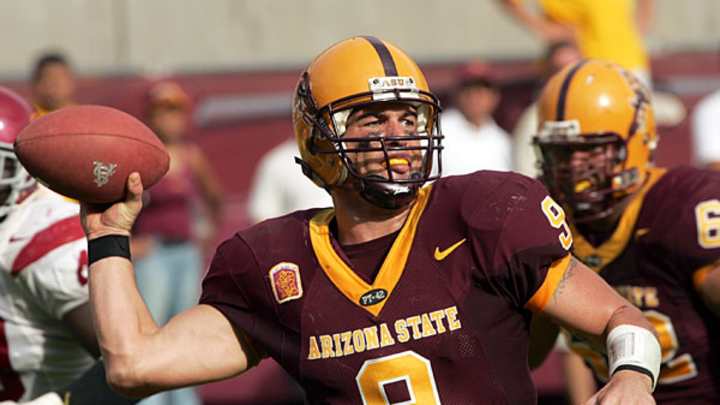NCAA announces $20M settlement with Keller plaintiffs over video game claims

The NCAA has reached a settlement with plaintiffs led by ex-Ariz. State QB Sam Keller. (Stephen Dunn/Getty Images)

With the O'Bannon v. the NCAA trial beginning, the college sports world has turned its attention to a courtroom in Oakland, Calif. Yet some major news surfaced before anyone involved in the case took the stand. The NCAA announced on Monday morning that it has settled in the Sam Keller lawsuit -- a separate case from O'Bannon -- by awarding $20 million to "certain Division I men’s basketball and Division I Bowl Subdivision football student-athletes who attended certain institutions during the years the games were sold."
Electronic Arts and the Collegiate Licensing Company, former co-defendants in the O'Bannon case, which surrounds the rights to student-athletes' names, images and likenesses, recently reached a $40 million settlement. Via the NCAA's press release:
“With the games no longer in production and the plaintiffs settling their claims with EA and the Collegiate Licensing Company, the NCAA viewed a settlement now as an appropriate opportunity to provide complete closure to the video game plaintiffs,” said NCAA Chief Legal Officer Donald Remy.
The complete details of the settlement remain to be finalized.
This settlement, and the previously announced settlement between other parties to the litigation, could result in some current FBS football or Division I men's basketball student-athletes receiving a monetary award from a settlement fund.
"Consistent with the terms of a court-approved settlement, the NCAA will allow a blanket eligibility waiver for any currently enrolled student-athletes who receive funds connected with the settlement. In no event do we consider this settlement pay for athletics performance," Remy said.
This settlement should have no impact on the O'Bannon trial, which the NCAA views as separate from the decision to settle in the Keller case. In the press release, Remy notes that the O'Bannon plaintiffs are not seeking monetary damages, but rather posing "attacks on the college model."
SI.com legal expert Michael McCann offered the following analysis:
NCAA reaching settlement with EA & CLC significant mainly because of evidence: settlement makes EA/CLC less likely to share info w/O'Bannon.
— Michael McCann (@McCannSportsLaw) June 9, 2014
For more analysis of O'Bannon v. the NCAA, check out SI.com's complete coverage hub.
